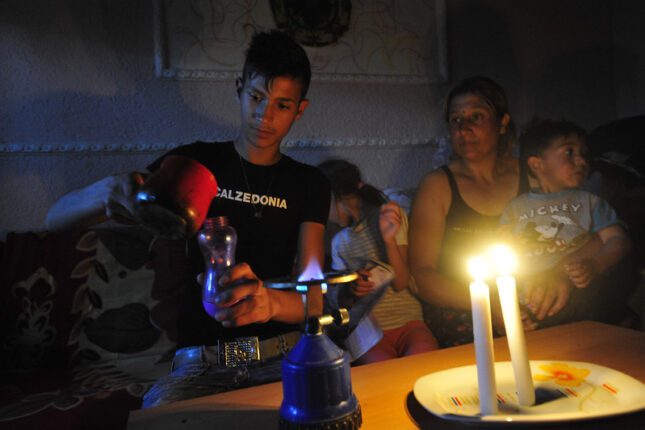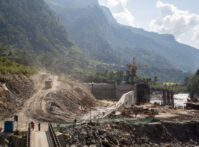-
An EU Lifeline Puts Norway in Russia’s Bullseye

Since Russia’s full-scale invasion of Ukraine on February 24, 2022, the Kingdom of Norway has played an ever-increasing role in reducing the European Union’s energy dependence on Russia. It will likely continue to do so in the near term, creating a stronger yet more sensitive relationship between the EU and one of its non-member states.
Yet as Norway expands its portfolio as a major supplier of both fossil and alternative energy resources to Europe, political shifts in one polity now have a greater chance of reverberating in its counterpart. The EU’s dependency on this Nordic lifeline also risks becoming a strategic chokepoint, especially at a time when Russia has demonstrated its increased willingness to utilize hybrid warfare and sabotage tactics against NATO members in Europe.
Norwegian Energy and Europe in Ukraine’s Shadow
Norway has long been an innovator in the energy sector, and it has gradually grown to be a major energy exporter in both the realm of fossil fuels and (more recently) renewable energy. These resources contribute to Norway’s unique geopolitical position on the continent, which has taken on new significance as the vulnerability caused by many European countries’ reliance on Russian energy has become apparent since the invasion of Ukraine.
Russia has cut off oil and gas supplies to Europe since the invasion to exert geostrategic leverage, while the EU has sought to punish Russia economically through sanctions on imports. The result is that an energy-hungry continental Europe has sought to expand new energy partnerships and diversify its energy sources rapidly.
Norway is ideally positioned to meet both demands. Russia’s overall natural gas exports to the EU via pipeline dropped from over 40% in 2021 to 8% in 2023. By the first quarter of 2024, however, Norway had become the largest exporter of pipeline natural gas to the EU, providing 46.6% of the bloc’s total imports. Norway also now exports 13.6% of the EU’s petroleum oils, making it the second-largest individual country contributor behind the United States. In 2022, one-third of the gas consumed in Europe was sourced from Norway.
Norway also has sought to promote itself as a green energy partner for Europe. The nation is a pioneer in hydrogen and wind power, as well as being rich in the minerals needed for the production of green technologies. In March 2024, the EU and Norway signed a Memorandum of Understanding which expanded their existing Green Alliance to include the mutual development of land-based raw materials and battery value chains.
However, such ambitions for greater interconnectivity between Norwegian supplies and European markets must take acute vulnerabilities into account. Energy prices within Norway have increased as a result of exports to the greener, yet less stable, German energy grid. Higher prices also have contributed to a domestic political backlash against EU energy directives. Norway’s agrarian Centre Party split from the governing coalition early in 2025, leaving the Labour Party to lead a minority government. Norway’s government has reportedly been considering curtailing exports to the EU in anticipation of the next Norwegian general election in September 2025, but so far has not done so.
In theory, the recent trade deal between the EU and the US threatens to sideline producers like Norway through its requirement that the bloc triple its US energy imports over the next three years. Many regard this deal as unfeasible in practice, however, and Norway is likely to remain a vital supplier of European energy.
Potential for Sabotage
External threats to Norway’s energy contributions to Europe are posed by the very foe that enabled the Kingdom’s opportunism in the first place. Russian hybrid warfare in Europe has ramped up since the escalation of the Ukraine war in 2022. Recent damage to undersea power and telecom cables allegedly perpetrated by Russia or its allies in the Baltic Sea are only one noteworthy example. Norway’s oil and gas production primarily occurs on offshore platforms that are increasingly powered by renewable electricity generated on the mainland. Thus, the undersea cables that provide this electricity are prime targets for further attacks by Russian-aligned saboteurs.
The Chief of Norway’s National Security Authority, Lars Christian Aamodt, warned in 2024 that the Kingdom’s energy infrastructure was vulnerable to physical sabotage and cyberattacks. He observed that “Europe has become more dependent on Norwegian gas,” and that “as the dependency increases, so will the threat and the risk.” Another notable threat comes from vessels associated with Russia’s “shadow fleet” and erstwhile commercial vessels outfitted with surveillance equipment which have meandered near the Norwegian coast’s energy infrastructure.
The Kingdom currently operates 23 oil fields in the Norwegian Sea and two in the Barents Sea, with a third under development. In 2022, Equinor announced a $1.44 billion investment in developing yet another gas field in the Norwegian Sea north of the Arctic Circle. In early 2023, the Norwegian government opened as many as 92 petroleum exploration blocks in the Arctic for energy companies to survey and potentially exploit.
The confluence of the expansion of Norwegian energy infrastructure, EU diversification of energy imports, and Russian escalation of hybrid warfare with NATO members is a significant development in the region. Not only has it heightened the relevance of Norway’s energy sector, but it also means that the country has become a political player in European energy debates and a strategic asset and vulnerability as Russia threatens NATO’s critical infrastructure.
Griffen Ballenger is a public policy professional specializing in Arctic geopolitics and transatlantic relations. He is a strategy & consulting analyst for Accenture Federal Services. Ballenger holds a Master’s of Global Policy Studies from the University of Texas at Austin.
Patrick Kornegay, Jr. is a former US Teaching Assistant with Fulbright Austria. He received an MA from the George Washington University’s Elliott School of International Affairs, and has studied abroad at the Hertie School of Governance in Berlin, Germany. His research focused on international security, diplomacy, and memory politics in Europe and Eurasia.
Sources: Council of the European Union; European Commission; Eurostat; Foreign Policy; Norwegian Petroleum; NYTimes; Oilprice.com; PBS; Politico; Regjeringen.no; Reuters; The Parliament Magazine
Photo Credits: Courtesy of Flickr user World Bank Photo Collections.
 A Publication of the Stimson Center.
A Publication of the Stimson Center.








